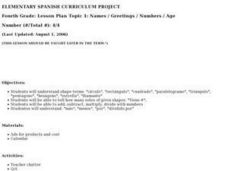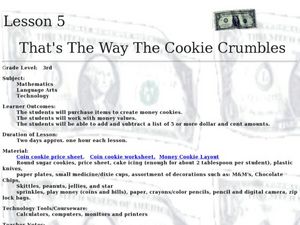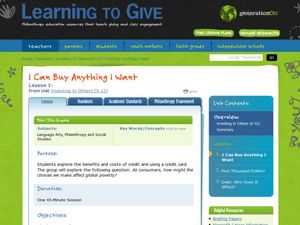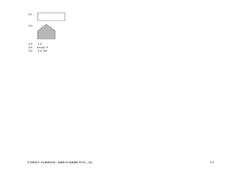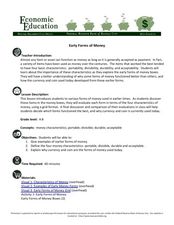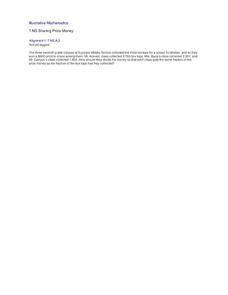Federal Reserve Bank
Keep the Currency
Each day, people throw currency away in different ways because of a lack of financial knowledge. Introduce your learners to the importance of financial literacy and assess their understanding of banking and personal finance.
PBS
What Is Money?
Early learners participate in a bartering activity during which they make connections to money and consumer concepts. They simulate buying and selling situations with one another then visit an exhibit at the Federal Reserve Bank of...
Curated OER
Money Marvels
Second graders explore various combinations of coins and dollars that add up to make given totals. They complete five different studying stations, completing a worksheet at each center, and mentally perform calculations involving...
Curated OER
Money and Math
Not only will your young Spanish speakers develop shopping/ money vocabulary, they'll practice basic math as well! This plan will take no longer than 10-15 minutes and just has learners look at different products and do simple math. If...
Curated OER
The American Currency Exhibit
Examine the historical structure, the purposes, and functions of the United States monetary system. Your class engages in a scavenger hunt to compare U.S. currency notes from specific eras throughout U.S. history. They work to identify...
Curated OER
Let's Make A Deal
Third graders make a picture money book. In this money lesson plan, 3rd graders read The Monster Money Book, discuss money terminology, watch a video on money and draw an example of the barter system. Students use the Internet to find...
Curated OER
That's The Way the Cookie Crumbles
Third graders work with money values and making purchases. In this money lesson, 3rd graders listen to Donna Guthrie's book, Real World Math: Money and Other Numbers In Your Life. They make money cookies either with a recipe or with...
Curated OER
George's Place
Here is another in the interesting series of lessons that uses money as a learning tool. This one is especially clever! During the lesson, pupils pretend they are eating at "George's Place" diner. Small groups are given one bag of play...
Illustrative Mathematics
Field Day Scarcity
Introduce young mathematicians to concepts of financial literacy with this open-ended word problem. With seven dollars to spend during field day and given a list of available items and their prices, children must determine how they want...
Curated OER
Third Grade Math
In this math worksheet, 3rd graders answer multiple choice questions about estimation, number sentences, money, and more. Students complete 25 questions.
Curated OER
I Can Buy Anything I Want: Consumer Debt and Social Responsibility
A clear, comprehensive overview of consumer debt, credit, interest, international currency, and social responsibility, this 45-minute session falters in the application stage. You'll need to create a way for learners to demonstrate their...
Curated OER
Estimation
Select items to purchase from a store, add up the total cost, then estimate the total cost! Kids count out the money needed to make the purchase and pay for the items. An excelent way to connect real life math and estimation!
Curated OER
Cutting Costs With Coupons.
Learners clip coupons for food items, create a menu using those items, and add up the total savings. They correctly calculate the total amount of money that would be saved if they used the coupons.
Curated OER
First Grade Math: 1-3
In this first grade math review worksheet, 1st graders answer multiple choice questions about symmetry, money, measurement, time, and more. Students complete 25 questions.
Curated OER
Number and Operation: All About Monday - Does it Pay?
Solve real-world financial math problems. High schoolers will work through a series of problems as they look at credit card interest, bill payment, and other real-world personal money matters.
Curated OER
Third Grade Math
In this math review worksheet, 3rd graders answer multiple choice questions about measurement, the calendar, money, and more. Students complete 25 questions.
Curated OER
Colonial American Trade, Currency, and Economy: The instability of a colonial economy
Students view an image of Nathanial Hurd's "Table of Conversions." They will work in small groups to complete a worksheet. Students participate in a discussion about colonial Boston's economy. This instructional activity is a precursor...
Curated OER
Early forms of Money
Students become familiar with the importance of money now and the forms of money used in the past. In this money lesson, students investigate the cour characteristics of money: portable, divisible, durable and acceptable. Students...
Curated OER
Mental Money
Learners access prior knowledge to round numbers and add decimals. In this mental math lesson plan, students share the book Betcha and calculate estimates for three jars based on the book. Learners calculate money answers based on coins...
Curated OER
Money Math Lessons for Life
An outstanding lesson on financial literacy is here for you. Learners are presented with six scenarios, then compute the amount of savings they will have in their accounts. They complete a series of exercises designed to teach them that...
Illustrative Mathematics
Jim and Jesse's Money
Jim and Jesse started their road trip with the same amount of money. Your class must find the amount of money each one had given, the amount of money spent, and the ratio of money at the end. This is a comprehensive problem that takes...
Illustrative Mathematics
Currency Exchange
Take your class on a North American adventure with a currency conversion problem. Pupils are asked to change US dollars into Canadian dollars and then to Mexican pesos. The commentary includes two solutions, converting by unit rates and...
Federal Reserve Bank
The Fed Is Protecting Your Money
A dollar bill, a check, a credit card, and... a cow? What exactly are the various forms of payment that exist today? Your learners will identify the three functions of money in this lesson. In addition, they will discover the most common...
Illustrative Mathematics
Sharing Prize Money
When three classrooms are to split up prize money, your mathematicians must find the percentage that each class deserves and calculate the total amount. There is an option to use a calculator and practice rounding.





